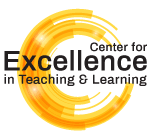ARCHIVE: Workshops & Events
|
|||||||||||||||||||||||||||||||||||||||||||||||||||||||||||||||||||||||||||||||||||||||||||||||||||||||||||||||||||||||||||||||||||||||||
 The Marvels of Adobe Creative CloudFacilitators: Sean Quallen, Jen ElbekDid you know that University of Idaho has made available the entire Adobe suite to its employees? Join us as we discuss capabilities and identify helpful applications to enhance instruction and research within the suite. |
 Timely and Meaningful Feedback: Simple yet Essential Steps to Student SuccessFacilitator: Douglas HabibTimely and meaningful feedback is important for our students to develop and grow over time; however, we face challenges in both generating feedback and using it advantageously. When you attend this workshop you will get to delve into how you can advance learning, persistence, and a growth mindset through timely and meaningful feedback. Specifically, participants will learn how to develop and deliver a variety of feedback opportunities designed to help students grow and thrive. |
|
 Equitable Canvas Part 1: Enhancing AccessibilityFacilitator: Jen ElbekJoin us as we explore practical strategies and tools to create an inclusive digital environment within your Canvas courses and discover how small adjustments can lead to significant impacts. |
 Making Time for the Learning to Happen: Opportunities and Strategies for Reflection and Integrated LearningFacilitator: Brian SmentkowskiOne of the mistakes we occasionally make is assuming that because we teach, our students learn. We need to connect our teaching to learning, and sometimes that simply means giving them time and opportunities for the learning to happen. In this session we will explore strategies to foster meaningful critical reflection and how to help students think about their thinking and learn about their learning. This requires surprisingly little effort on our part. Participants will be given templates and strategies designed to help students articulate their learning and a simple “cognitive wrappers” rubric that helps students become more aware of (and correct) the factors affecting their learning in the classroom, in the field, and even abroad. Faculty seeking to develop and enhance community-engaged/service-learning classes may find this session particularly interesting. |
|
 Equitable Canvas Part 2: Building in InclusivityFacilitators: Sean Quallen, Jen ElbekFrom diverse content representation to fostering a sense of belonging, this session explores actionable steps to ensure inclusivity becomes a cornerstone of your Canvas courses. Join us in this exploration of creating classes in which every learner feels seen, heard, and valued. |
 Challenging Students Ways of Thinking and KnowingFacilitator: Brian SmentkowskiAt the heart of the teaching and learning enterprise --and a liberal education itself-- is the development of independent, creative, and critical thinking and thinkers. Indeed, the fundamental mission of the university is to preserve, extend, and promote the tradition and practice of thinking things through. In this session, we will examine strategies to build these skills, to liberate learning and thought, and to challenge intellectual deference and indifference. |
|
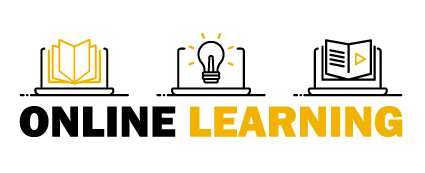 Effective Online Practices RoundtableColleagues: R. Afatchao, R. Love, M. GrozaGood practice in online education includes engagement, substantive interaction, and instructor presence. How that’s done can vary by discipline, class size, and available technology and it’s something of an art, rather than a collection of hard and fast rules.
Come to a roundtable discussion with your colleagues Ro Afatchao, Renee Love, and Mark Groza as they talk about how they are approaching the challenges of engagement, presence, and substance. Afterwards we can all share our own successes and questions about how to have an engaging and substantive online experience. |
 Teaching Tomorrow: Empowering Educators with AI ToolsFacilitator: Jen ElbekIn this presentation, we’ll look at some of the most common AI programs available to examine how they can be utilized as learning tools in the classroom. By incorporating engaging teaching strategies, we’ll give tips on how to integrate AI into learning, which can help mitigate misuse by students. |
|
 AI-Does Where We Stand Depend on Where We Sit?Colleagues: C. Johnson, J. Ritcher, B. RobisonGenerative text AI has taken the UI by storm! We in the UI community are wrestling with how to integrate it, if at all, into our classes, research, daily tasks, and curricula.
“AI – Does Where We Stand Depend on Where We Sit?” is a roundtable conversation in which we will explore our perspectives on generative text AI and how those perspectives might influence our decision making on AI use for teaching and learning and in the curriculum. Join your colleagues Casey Johnson, Jamaica Ritcher, and Barrie Robison as we explore our areas of convergence and divergence on how we approach our brave new world. |
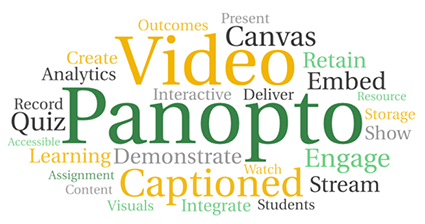 Panopto Video Platform: Getting Started (Part 1)Facilitator: Sean QuallenUnlock the power of Panopto within Canvas! Topics covered:
|
|
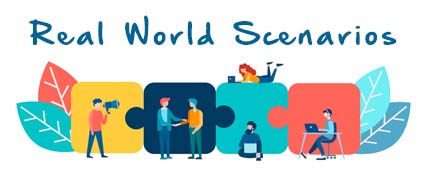 Make it Matter: Real World Scenarios, Applications, and ExperiencesFacilitator: Jen ElbekWhen it comes to engagement in any learning environment, authenticity and relevance to students matters. Bringing in opportunities for students to apply what they are learning to real world scenarios makes course content more meaningful, impactful, and memorable. Real world scenarios, applications, and learning experiences –including service learning, guest speakers, study abroad and COIL opportunities—also stimulate student interest, motivation, and perseverance. In this workshop participants will map out opportunities and tasks designed to reveal real-world applications of knowledge and experience and the learning goals that can be attained through them. |
 Panopto Video Platform: Intermediate (Part 2)Facilitator: Sean QuallenUnlock the power of Panopto within Canvas! Topics covered:
|
|
 Visual Interest: Utilizing AI and Adobe for Impactful ImagesFacilitator: Jen ElbekIn this session, we explore how AI can enhance the creative process, from generating visually stunning graphics to curating compelling content. Discover the seamless integration of AI technologies and Adobe Stock, empowering you to effortlessly infuse your materials with visual appeal. |
 Self-Directed Learning Modules to Improve Student Performance In and Beyond STEM DisciplinesFaculty: Tao XingGenZ students (ages 17-22) are more self-paced, self-directed, and independent, with freedom of what/how they learn. Previous studies have shown that a positive relationship exists between engineering students' self-directed learning abilities and online learning experience. Our research demonstrates the impact of self-directed learning modules on student success. We will share key design elements that make such modules effective, and strategies for fostering innovation at the intersection of teaching, learning, and scholarship. Dr. Tao Xing presented this Faculty Spotlight with his cohorts Dr. Steve Beyerlein, Dr. John Crepeau, and Dr. Sean Quallen. |
|

Panopto Video Platform: Advanced (Part 3)Facilitator: Sean QuallenUnlock the power of Panopto within Canvas! Topics covered:
|

Fostering Interactivity in Canvas Part 1: Built-In ToolsFacilitators: Jen ElbekFrom discussion boards to quizzes and collaborative features, discover how leveraging tools can foster active participation, deepen understanding, and create a dynamic virtual classroom. |
|
 Show What You Know: -Going Public- with LearningFacilitator: Sean QuallenPublic demonstrations of learning and skill are not limited to classes and disciplines historically associated with public performances (music and theatre, for example); they can provide invigorating, rewarding, and professionally relevant ways for students to collaborate, develop, show, and build confidence in and beyond the classroom. Presentations, posters, and peer review practices go beyond traditional classroom learning, offering students opportunities to actively engage with the subject matter and develop vital skills, even in online courses. Participants will explore an inventory of activities and strategies drawn from across the curriculum and discover how they can foster essential skills like communication, creativity, and collaboration that equips them for life beyond the academy. |

Using Generative Text AI to Reinforce your SyllabusDouglas HabibWhen writing syllabi, the things you bring to the table that AI can’t provide are your goals and values for the course. Nevertheless, AI Large Language Models (LLM) can help us to reinforce the goals or values in our course syllabi as well as help us identify how we can include those values when assessing students’ achievement. Come to a Zoom workshop with CETL in which we will use a LLM to receive feedback on a syllabus and explore new ways to assess our learners. | |
 Fostering Interactivity in Canvas Part 2: External ToolsFacilitators: Sean QuallenFrom collaborative platforms to multimedia resources, the University has integrated multiple external tools into Canvas. Join us as we uncover a myriad of possibilities beyond the Canvas ecosystem, exploring third-party integrations that can supercharge your online courses. |
 Digital Activities to Enhance Formative AssessmentFacilitators: Jen Elbek, Sean QuallenFormative assessment is an ongoing, interactive process that involves collecting and using feedback to inform and adjust teaching methods in real-time. Join us as we explore digital activities you can include into your courses to provide real-time comprehension checks for your students. |
|
Fall 2023 Workshops & Events
High Impact Practices & Pedagogy
 Panopto 101: Making Videos in CanvasFacilitator: Sean QuallenLearn how to use Panopto, the exciting new video creation app, now integrated into Canvas! We’ll introduce you to the features of Panopto and guide you through creating your first video. more info >> |
 Aiming High: Setting and Achieving High StandardsFacilitator: Brian SmentkowskiIt is good academic practice to hold students to high expectations, though it is often a challenge to calibrate those expectations to both an appropriate level of rigor required of a class and student expectations of what is reasonable to them. In this session we will explore ways you can chart a path towards appropriate performance expectations at the course and curriculum level while enlisting students on the journey so you can help them to thrive. |
|
 Panopto 101: Student Engagement with PanoptoFacilitator: Jen ElbekSo you know the basics of using Panopto but now what? Come learn how you can utilize what Panopto offers to make video-based tasks to engage your students in the learning process. more info >> |
 Panopto 101: Flip Your Course with Panopto!Facilitator: Sean QuallenTo Flip Your Course means to make the lecture portion of the lesson available online, saving the interesting discussions and hands-on activities for in-class. Learn how Panopto can help you easily facilitate adopting this format. more info >> |
|
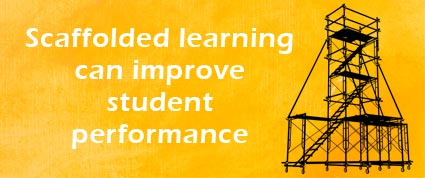 Scaffolding the Learning ProcessFacilitator: Douglas HabibWe all have an image of what success looks like in our classes, but what if we focused on learning as a process and not exclusively or necessarily a product? Scaffolded learning activities provide students the opportunity to do the same amount of work, to master the same content, and to accomplish key learning goals, but in a segmented way that allows them to benefit from feedback en route to an A. Scaffolding facilitates deep learning, cumulative learning, metacognition, and increased learner independence. This workshop is your opportunity to take one of your learning activities and restructure it so you and your students can enjoy the benefits of scaffolded learning activities. |
 Experimenting with ChatGPTFacilitator: Jen ElbekThis interactive session provides a quick glimpse into how ChatGPT operates and the significant limitations, and potential benefits, for educators. more info >> |
|
 Build a Fun Escape Game with Google FormsFacilitators: Jen ElbekAre you tired of relying on Kahoot! to create fun learning activities in class? Look no further than Google Forms! In this workshop, you’ll learn the basics of creating an escape game puzzle online that will challenge and engage your students. |
 From the Ground Up: The Basics of Canvas Course DesignFacilitator: Sean QuallenHave you ever wondered if you’re doing this whole Canvas course creation appropriately? We can help! We’ll show you the basics of building your course from scratch, with guidance for creating the best experience for you and your students. more info >> |
|
 Meaningful Interactions: The Key to Engaged LearningFacilitator: Jen ElbekThere is a lot of buzz about Regular and Substantive Interaction in higher education, and for good reason: it is at once a federal and accreditation-based requirement for all online classes and the foundation of good teaching and learning across instructional modalities. This requires us --and our students-- to be present and engaged with course content and one another throughout the course of the semester. In this workshop you’ll learn not only how RSI expectations apply to your online classes, but you will also gain creative, engaging, and innovative ways to apply interactive learning techniques in all of your courses. more info >> |
||
Spring 2023 Workshops & Events
Getting at the Learning
 Handle with Care: Practical Strategies to Support Trauma-Informed TeachingFacilitators: Heather Maib, Laura HolyokeIn this session, we discussed ways to create and sustain a compassionate learning environment. We focused on trauma-informed practices we could integrate into our teaching while maintaining healthy professional boundaries. |
 Regular and Substantive Interaction in Online ClassesFacilitators: Douglas Habib, Brian SmentkowskiOne of the hottest topics in higher education is the expectation of Regular and Substantive Interaction (RSI) in distance education. This includes online courses and programs. In addition to the positive effects of RSI on student success, the University of Idaho --like all other colleges and universities-- has to demonstrate a commitment to Regular and Substantive Interaction in all online courses and programs. Our goal was to provide an overview of what Regular and Substantive Interaction means, why it matters, and to share strategies for adding “regular” and “substantive” interactions into your online courses and programs. |
|
 What Can the Zoo Do?: Animals and Social Change in ArgentinaFaculty: Dr. Ashley KerrIn this talk, Ashley Kerr discusses her sabbatical research at the Buenos Aires Zoo in Argentina. What’s it like to be given access to two rooms packed with dusty and completely unorganized boxes of archival materials with peacocks and Patagonian maras wandering by? And what can the documents inside tell us about how Argentine elites used the zoo and its animals to shape society in the early 20th century? |
 Simple Strategies for Regular and Substantive Interaction (RSI)Facilitator: Sean QuallenIn this workshop on Regular and Substantive Interaction in Online Classes, we discussed an inventory of strategies designed to establish predictable patterns of meaningful interaction. Participatns were invited to share useful, impactful, and easy-to-adopt practices to provide and document regular and substantive interaction in asynchronous classes and programs. |
|
 What Can Video Games Teach Us About Criminology and Society?Faculty: Dr. Kristine LevanThe nuances of games and the video game subculture are critical to understanding their importance in society. As the relevancy of video games has increased, this has subsequently impacted perceptions on issues such as crime and justice. Issues such as gamer identity, as well as broader issues of video games were also explored. |
 2023 Student Success ConferenceCo-hosts: VP Academic Initiatives, CETLThe Power of Agency |
|
 Tools available in support of Regular and Substantive Interaction (RSI)Facilitator: Sean QuallenIn this workshop on Regular and Substantive Interaction in Online Classes, we took a deeper dive into actual tools available in support of RSI. We learned about easy-to-adopt tools which are used to provide and document regular and substantive interaction in asynchronous classes and programs. |
 Tracking Student Competencies from the Freshman to the Senior YearFaculty: John CrepeauA group of faculty members in the Department of Mechanical Engineering developed a unique assessment to determine how well student skill developed over the course of their educational experience at the University of Idaho. This session showcaseed assessment in a unique and positive light - one that maps and supports learning gains and skill development from the freshman year to the senior capstone, and then to the workforce. This session also highlighted the value of collaboration in advancing--and documenting--student success. |
|
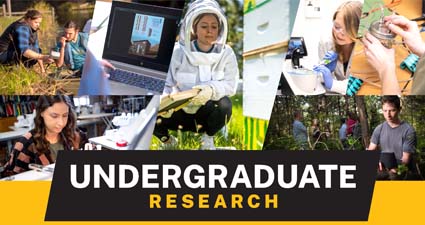 Defining and Redefining Undergraduate Research at the University of IdahoFacilitator: Kristopher WaynantThe University of Idaho is a regional leader for both the many Undergraduate Research opportunities and the diversity of projects supported. This seminar first discussed the types of research and creative activities ongoing at UI, the resources provided, and how student experiences are showcased. The conversation then ventured into assessment and tracking of UG research and ongoing interests in defining the optimal “dosage” of research and redefining the optimal “outcome” from a research or creative arts activity. |
 2023 Undergraduate Research SymposiumOrganizer: Office of Undergraduate ResearchThe Office of Undergraduate Research hosts this annual university-wide undergraduate research symposium which showcases student research, scholarly work and creative activities from all disciplines at U of I. Students present and display their work to the campus community, visitors, family and friends. |
|
 Roundtable: AI at the UIFacilitator: Douglas HabibText prediction applications like ChatGPT and search engines like Bing are all the rage these days and you may be looking at their impact on teaching and learning in the academy with excitement at the possibilities, deep suspicion, or a combination of the two. We at CETL want to provide a venue where you can come together with your colleagues and share your ideas, experiences, questions, and concerns regarding AI in academia. In this Round Table discussion, we will discuss how instructors and staff have used AI programs in their work, the ethics of using AI, and possible policies the UI can adopt as we wrestle with the rapidly changing AI landscape. |
|
|

